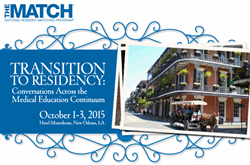NRMP Announces Inaugural Main Residency Match Stakeholder Conference


Washington, D.C. (PRWEB) February 19, 2015
The National Resident Matching Program® (NRMP®) is pleased to announce its inaugural national conference, “Transition to Residency: Conversations Across the Medical Education Continuum”, taking place October 1-3, 2015 at the Hotel Monteleone in New Orleans, La. This meeting will offer a unique opportunity for medical educators participating in the Main Residency Match® to collectively discuss ways to strengthen the transition from medical school to residency and foster the education of vibrant and capable new physicians.
“The transition from medical student to resident physician is an important milestone for young physicians, but it can be fraught with anxiety and pose a challenge for students and medical educators. Until now there has been no forum for medical school staff and residency program directors to collectively discuss common issues,” says Mona M. Signer, NRMP’s President and CEO. “Because the NRMP occupies a distinctive place in the transition from undergraduate to graduate medical education (GME), we are in a unique position to create a bridge between medical schools and training institutions.”
A cadre of nationally-recognized leaders in the field of medical education and healthcare will speak about topics ranging from physician decision-making and student readiness for residency to humanism in medicine. The conference also will address the Institute of Medicine report “Graduate Medical Education That Meets the Nation’s Health Needs” and its implications a year after publication, followed by a “point-counterpoint” discussion about the availability and funding of GME training slots.
Breakout sessions and a ”Town Hall” forum will provide valuable opportunities for medical school officials, GME program directors, and hospital executives to collaborate on key topics, identify best practices, and share innovative projects occurring at their schools and institutions.
Confirmed Speakers:
Pauline Chen, M.D. – New York Times columnist; author of “Final Exam”
Richard A. Cooper, M.D. – Director of the Center for the Future of the Healthcare Workforce and Senior Fellow in the Leonard Davis Institute of Health Economics at the University of Pennsylvania
Jerome Groopman, M.D. – New York Times bestselling author of “How Doctors Think”; Dina and Raphael Recanati Chair of Medicine, Harvard Medical School; Chief, Division of Experimental Medicine, Beth Israel Deaconess Medical Center
Pamela Harzband, M.D. – co-author of “Your Medical Mind”; Assistant Professor, Harvard Medical School; Attending Physician, Division of Endocrinology, Beth Israel Deaconess Medical Center
Fitzhugh Mullan, M.D. – Murdock Head Professor of Medicine and Health Policy, School of Public Health and Professor of Pediatrics, School of Medicine at The George Washington University
Deborah E. Powell, M.D. – Member, Institute of Medicine committee on GME financing; Dean Emeritus and Professor of Pathology, University of Minnesota Medical School
Abraham Verghese, M.D. – New York Times bestselling author of “Cutting For Stone”; Vice Chair for the Theory and Practice of Medicine, Stanford University School of Medicine
To learn more, visit the NRMP conference website.
The NRMP Match
The Match uses a computerized mathematical algorithm to align the preferences of applicants with the preferences of residency program directors in order to fill training positions available at U.S. teaching hospitals. Research on the NRMP algorithm was a basis for awarding The Sveriges Riksbank Prize in Economic Sciences in Memory of Alfred Nobel in 2012.
About NRMP
The National Resident Matching Program® (NRMP®) is a private, non-profit organization established in 1952 at the request of medical students to provide an orderly and fair mechanism for matching the preferences of applicants for U.S. residency positions with the preferences of residency program directors. In addition to the annual Main Residency Match for more than 40,000 applicants, the NRMP conducts Fellowship Matches for more than 50 subspecialties through its Specialties Matching Service® (SMS®).
###